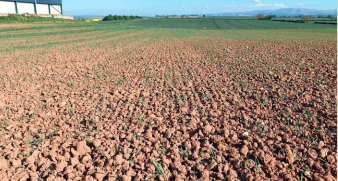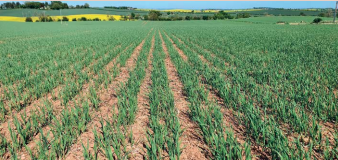
The 2020 season in the Scottish Borders
Neil White’s farming is a constantly evolving system which includes a comparison of Mzuri direct drilling with a ploughcombi in this difficult season.
It was a long and wet winter here, crops struggled, but most made it through the relentless rain into a bright, dry but cold spring. When I started strip tilling, in early spring I had to defend my winter crops to my now, late father. He never switched off the part of his psyche that defined good crops by green lines on brown soil. Come April he would admit that the crops looked good and by May, that they had great potential. ‘You need to keep your faith’ I would say as I believe strip-tilled crops are slower to get going in the spring. This year he would have given me a hard time as things did look bad, but most crops have recovered and some look to be full of potential again. I did however take out my second wheat, sown in great conditions just before the weather broke, and patch some wheat which was ploughed, drilled then flooded. The poorest crop left in is some Pearl winter barley, it is not a resilient crop at the best of times and with the NVZ not allowing autumn nitrogen on cereals I do struggle to get a good crop going into winter.
Wet weather resilience of direct and combi drilling
It has been very interesting to see how different fields have coped with the excessive wet weather we have had. It is very noticeable that the fields strip tilled the longest recover quickest. I am trying to work round my farm correcting any drainage problems, feeling this is something I have neglected in the past. This is based on a desire to look closely at what I expect from my soils. Reduced tillage has already helped the soils recover their water carrying capacity by keeping them aerobic and the fauna alive, so I must keep the drains running. In the fields where remedial work is done, I still plough to level the ground for spring crops and the difference this year between ploughed and strip tilled is very noticeable. The Mzuri drilling looks far better. It’s funny that if the roles were reversed people would use it as a reason not to strip till.

Direct drill and plough-combi comparison
I have Diablo spring barley and Canyon spring oats which, unusually, were both direct drilled and plough-combi drilled. This makes an interesting comparison. In the plough-based system the extra working of the soil as it dried out has been a massive problem this year as it has caused some very uneven crop emergence. The more I did to the ground, the more time and money I spent, the worse the crop looks. The wettest, very quickly became the driest. I walked over my ploughed and sown oat field and it was like gravel, dry and crisp and it stayed that way for 4 weeks after sowing until the rain came. In a perverse way it does help convince me to use the Mzuri drill on all my spring crops as those crops look far superior. They were drilled into over wintered stubble, untouched, no cover crop but with weeds sprayed off, the undisturbed soil retained the moisture and the crops never looked back. I put pictures on my Instagram ‘Everything is Greenknowe’ and a video on Youtube that I would suspect were fake if Mzuri or any manufacturer posted them.

Deeper front leg setting pays of
I ran the front leg a little deeper on my drill this spring at around 7inches and the coulter 1.5 to 2 as I was worried the cold soil maybe needed more loosening and lift. I think this paid off as the moisture was accessible around the seed and rooting area and the placed fertiliser gets it off to a good start. I didn’t have a dual tank on my original Mzuri and it worked well but the ability to place fertiliser in the new machine has made a very noticeable difference this year.
I often discuss with others the various tweaks or different approaches we use to fix problems that can occur with different systems and it is interesting to see what direction people choose. I have tried to resist buying additional equipment as I believe in the simple system. Lots of chat is about sub soiling and light disking or cultivation to remove problems, which I resist out of necessity as I do not have the tractors or people it requires at peak times. My approach now is to look backwards and think more about prevention, and while this is not a new thing it is a mindset I am trying to adopt.
I don’t think about what the ‘system’ can cope with, rather what can the ‘soil’ cope with. I look at the baler, muck spreader and trailers and consider whether it could be done a lot better, and after sowing for a neighbour who runs a CTF system I would love to be able to try that here. I can see myself continuing to chop more and more straw and restricting muck spreading to only suitable conditions, leaving it in the midden if need be. I used to only look at the benefits of these but now I also consider the damage that could be caused.
Straw rake bought but no grants in Scotland
I have however treated myself to a Mzuri Rezult straw rake this summer. This piece of machinery, like my drill, are bought purely on merit as we have no grants available to us this side of the border. Being a tight Scotsman, only 6 miles from the border, this really bothers me and through my involvement with NFUS any opportunity I have to lobby ScotGov I bring it up. I cannot believe that given all the rhetoric from the Scottish Government, the ‘all stick no carrot’ approach is the route they choose!
I still bought the rake however. I had been hiring, very cheaply, from a neighbour and I do one or two passes on rape stubbles prior to sowing. I found with hiring I haven’t been able to get two passes 10 days apart and I feel it’s unfair to take it to my contracted ground as it is very stony. I like this kit, despite the cost, because I do find given the weather, it halves the number of slugs and viable eggs and it does chit seeds in the top layer. I have asked the AHDB if they research this, but I am unaware if they have.
Prevention is better than cure
I have seen it written that we should ‘try to avoid singular solutions to singular problems’ so I am aiming for prevention, not mechanical cure. I like my local machinery dealers, but they do drive newer cars than me. I did manage to get rid of a spare 3.5m Kuhn power harrow we had had for years though so it is a one in one out policy on machinery. I am considering buying in compost for some of my stiffer ground. The geographical area I am in does not lend itself to cheap opportunities for these inputs so we will see. I hear a lot about the benefits it can bring so I think it would be worth pursuing and giving a try.
Future challenges
The farm next door to me is becoming available for contract farming and being next door, I was always going to be interested. This area is one of the most competitive in Scotland for this type of arrangement so it will be difficult to compete. The fact that I am considering taking more on and bidding what I think is a very competitive figure starts with the day I changed my system.
I cannot fail to mention the C19 pandemic, I hope you are all safe and well. I have to say that we are always aware how lucky we are, the job, homes, rural location and control we have over our social environment but never have we been more thankful than the last 3 months. I hope British farming comes out all the stronger in the end.
